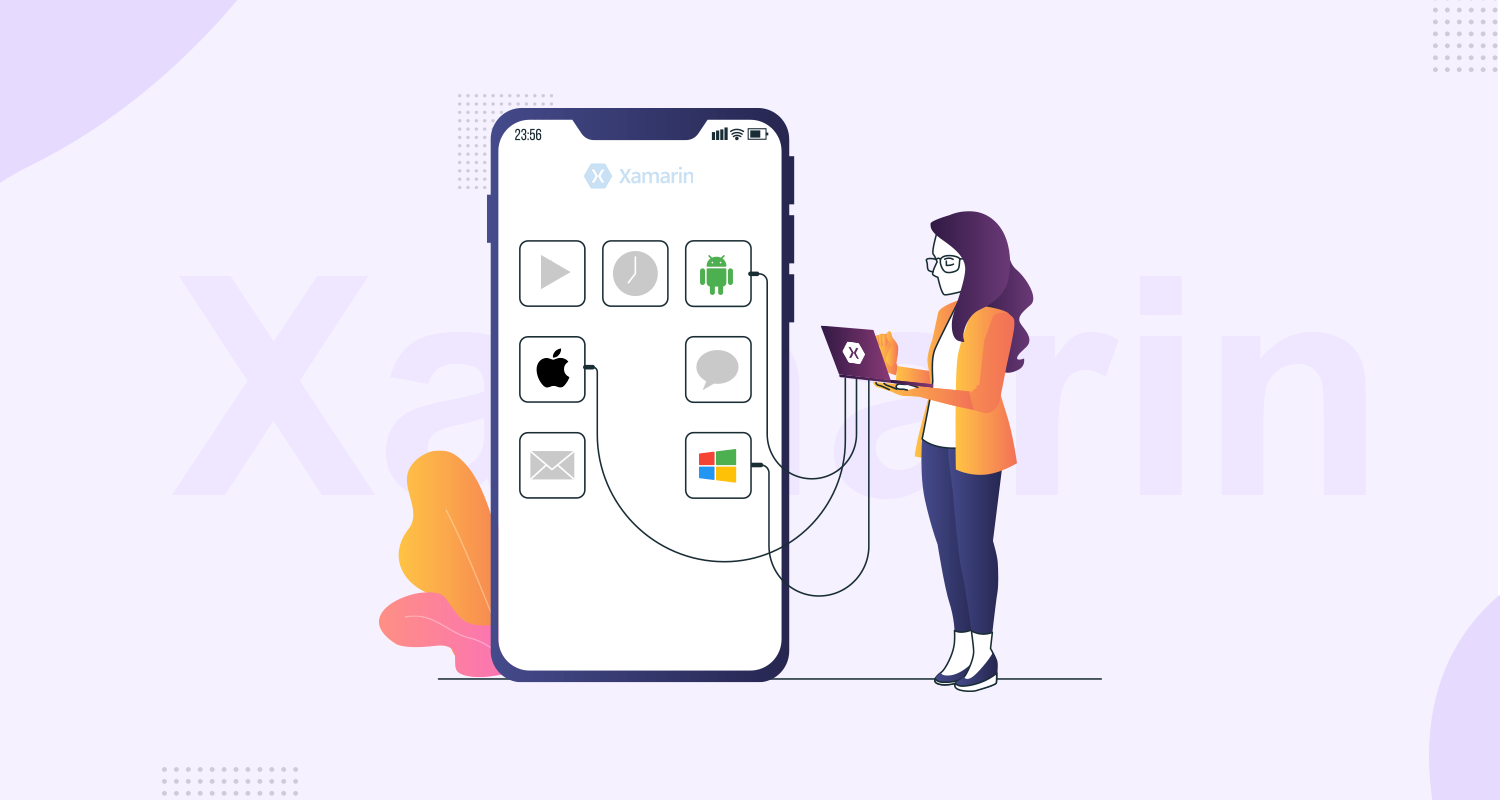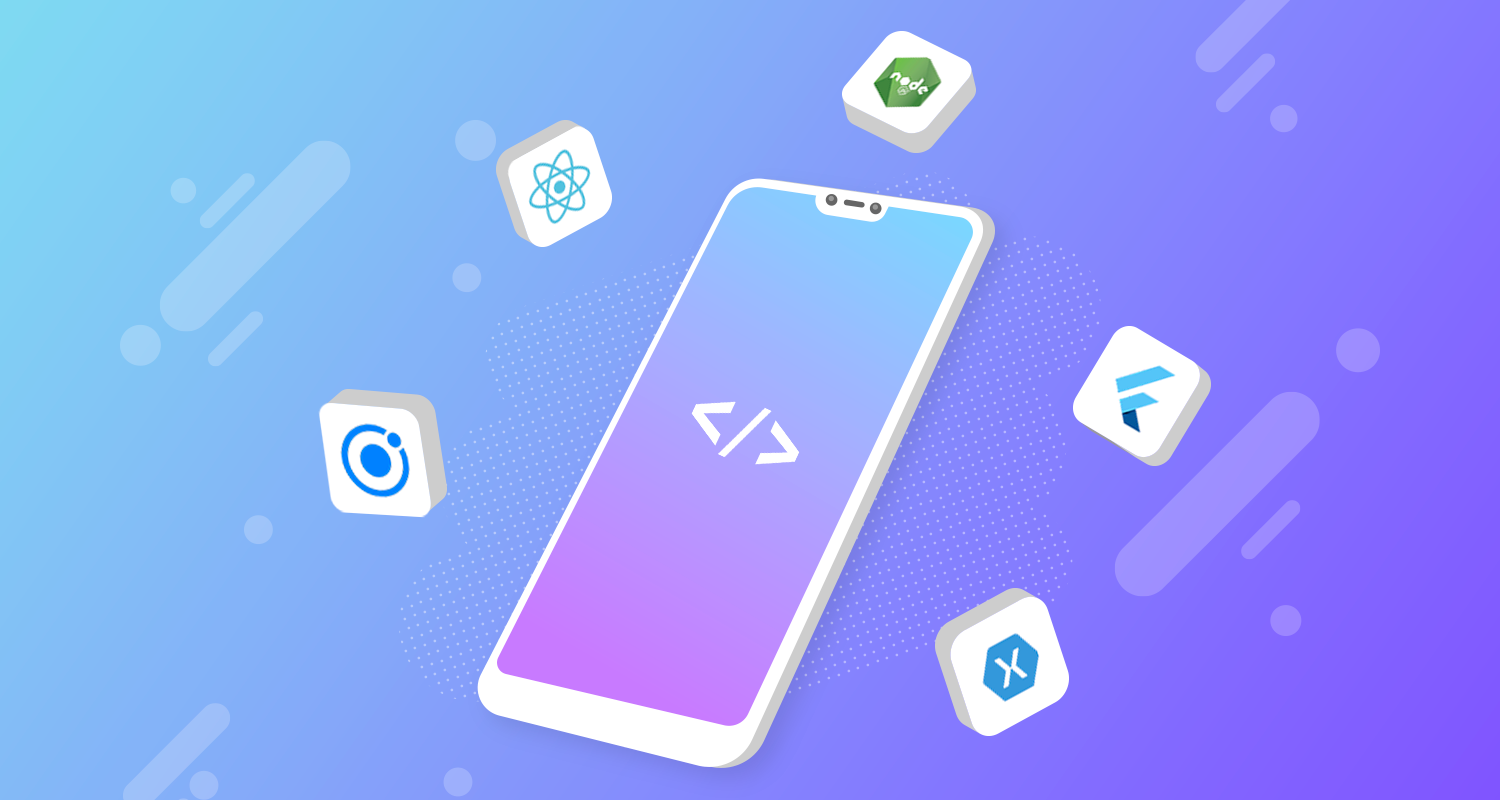In this modern era where competition among businesses is at its peak, app development has become the need of today for businesses of all types. Statista reports suggest mobile apps will generate $600 billion worldwide by 2025. Despite its growing importance, many people need help distinguishing between app development approaches. For them, the right solution comes down to deciding between the popular app development choice of web apps vs. native apps Vs. Cross-Platform Apps.
Since each app has benefits and disadvantages, going with the one comes with a challenge. Determining which app development approach connects with the audience better takes a lot of work.
The right approach to app development is crucial for success. Hence, choosing the right platform for a Mobile app development company is paramount, and your chosen platform depends entirely on your business.
Going with an irrelevant development strategy may result in developing an unproductive app which can affect the credibility of your business.
To end the debate, we have curated a blog detailing the differences between web apps ve native apps vs. Cross-Platform app development services. Continue to read.
What Are Web Applications?
Web applications are mobile or desktop-friendly websites accessible via a web browser. According to studies, 94% of website visitors determine a website’s accessibility based on its mobile capability.
The cost of developing web applications is less than that of developing mobile applications, and they’re also easier to maintain and build. Since web apps cost so little, businesses on a budget usually go with them. Testing web apps differs from testing mobile apps because web apps are made differently.
Pros of Web Apps
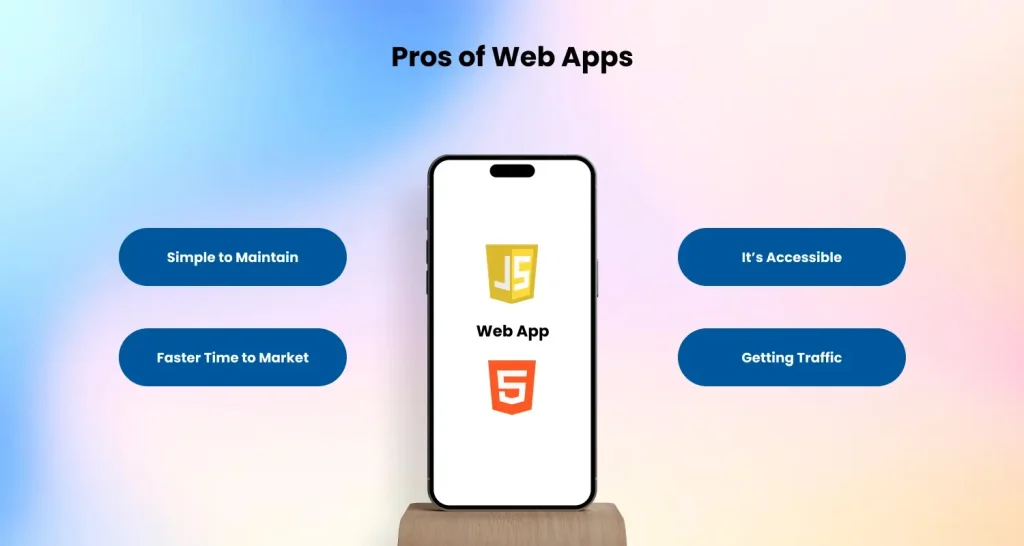
Undoubtedly, web apps are easier to use, more affordable, and less time-consuming to develop. Here are the top advantages of this approach.
- Simple to maintain. The coding for web apps is just as fast as regular websites so you can build and update them quickly.
- Faster time to market. A web app can be built faster, and because it doesn’t need to be approved by an app store, it can be released faster.
- It’s accessible. As web applications are accessible via web browsers, they are cross-platform and can be used by any device.
- Getting traffic. A web app is accessible from any mobile device, boosting search engine traffic.
Web App Cons
The development of web apps has several advantages but also some downsides. Web apps’ stability and device features are usually lower than native apps. Before you choose web apps, it is better to consider some of their cons:
- Requires Internet access. Apps can only be accessed with WiFi or cellular data.
- It is unstable. Running a web application can be problematic due to differences and changes in web browsers. Updating it regularly will require more maintenance resources.
- Less feature rich. Device features are not accessible, and a web application cannot access the native features of a mobile device.
Examples Of Market Giants Using Web Apps
- Trivago
- Tinder
When to Consider Web apps for app development?
- You are looking to release the app to the market quickly.
- Your business must be cross-platform compatible.
- Reaching a wider audience is crucial.

About Cross-platform Applications
A cross-platform mobile application is an app development approach compatible with multiple platforms (Android and iOS).
Its Multi-platform compatibility enables businesses to release the product more quickly and at a higher quality level. As the application is compatible with a number of mobile operating systems, it has the potential to reach a wider audience. Choosing a reliable Flutter app development services provider can add value to your cross-platform development project.
Benefits of Cross-platform Applications Development
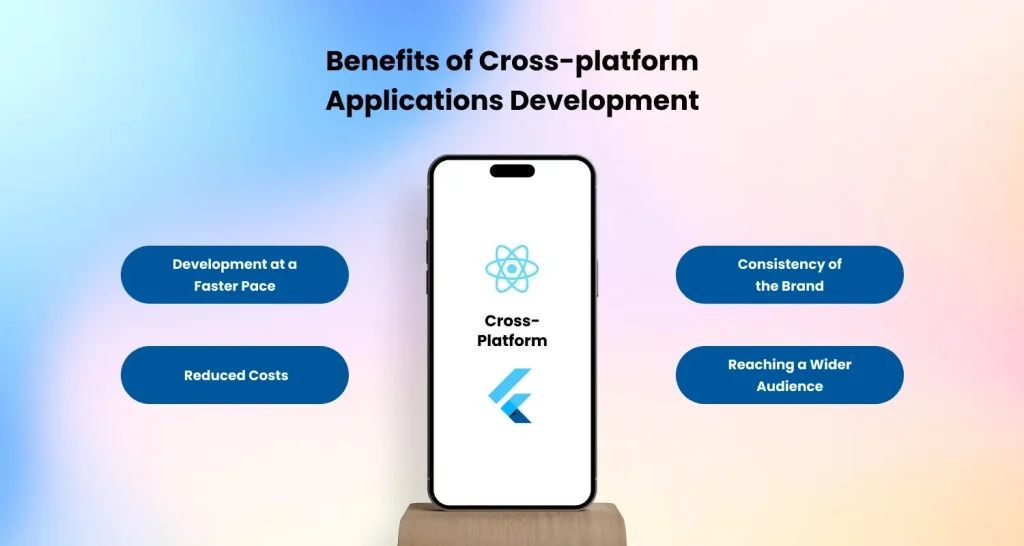
A cross-platform application sits somewhere between a native app and a web app, giving them the best of both worlds. Cross-platform applications offer the following advantages.
Development at a faster pace
Typically, cross-platform solutions require developers to work with only one codebase, which can handle iOS and Android, so separate Android and iOS projects are no longer required.
Reduced costs
Compared to native applications, cross-platform applications can cost approximately 30% less than separate apps for iOS and Android. As a result, no separate projects are required.
Consistency of the Brand
Creating separate apps for iOS and Android increases the task of maintaining a consistent look and feel for the brand and the product.
By utilizing cross-platform mobile app development, you can create a consistent image of your brand and give your customers the best possible experience.
Reaching a Wider Audience
Having your app available on multiple platforms will allow you to reach a broader audience, allowing business owners to increase their revenue. Downloading your mobile app on iOS, Android, and Windows devices will be possible.
Cons of Cross-Platform Apps
Despite its multi-platform compatibility approach and various other advantages, this mobile app development approach also has disadvantages. The following disadvantages should be considered before building a cross-platform app.
- Log in Updates: A cross-platform framework may not immediately support new features added to an OS, and you can only enjoy those new features once the framework is updated.
- Impact on Performance: Developing cross-platform applications requires juggling two competing priorities. As a result, you will experience different problems depending on your OS and even your device. By ensuring your app works on older devices and less powerful versions, you won’t be able to take advantage of newer devices’ full capabilities.
- Coding is Harder: The design and functionality of cross-platform apps need to adapt not only to the device but also to the platform, which is different. This makes it harder for developers since they have to handle different device and platform exceptions.
When to use Cross-platform Apps Development?
- A larger audience uses your app on many platforms – mobile and web.
- Connecting with your customers through simple apps without complex animations or features can be a great way to connect with them.
- Creating a multiplatform application is essential when you are time-constrained
Examples of Market Giants using cross-platform apps
- Airbnb
- Skype
About Native Applications
A native app is tailored for a specific platform (Android or iOS), and a user usually downloads them from an app store.
Native apps dominate mobile app development. The performance of native apps can be outstanding because they use platform-specific approaches and technologies.
Advantages of Developing Native Apps
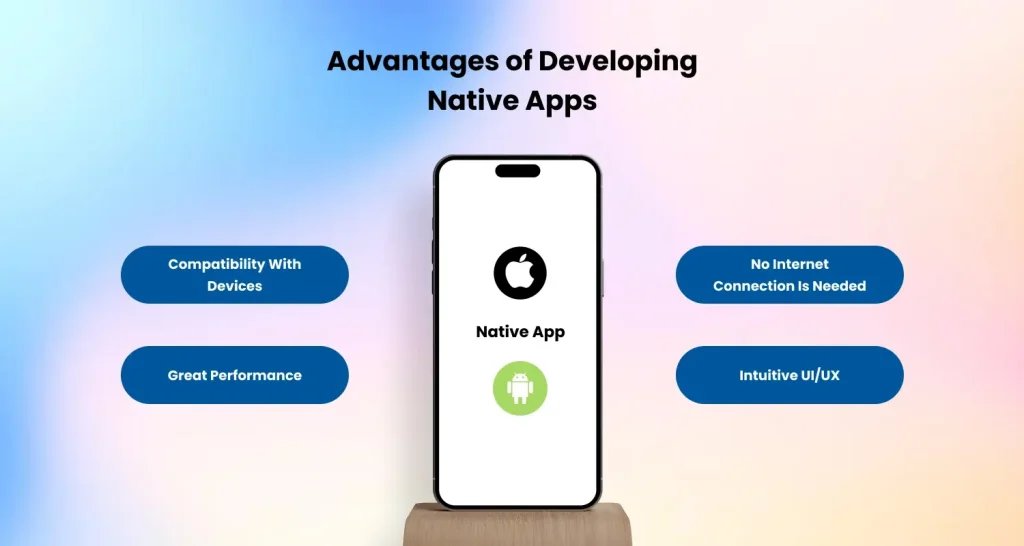
Streamlining your code base and optimizing performance is possible with a native app. Choosing a native app has several advantages.
- Compatibility with devices. They’re tailored to specific platforms, so they’re easy to use. Their applications make the best use of a device’s capabilities. Many features of native apps are available to users, such as GPS, memory management, cameras, microphones, and more. Thus, users have a great experience.
- Great Performance: Performance is great, and a native application considers the platform’s specifics. You can bend them however you like; they’re typically fast, responsive, and flexible. Your developers are likely to create whatever you dream up.
- No internet connection is needed. To access the native app, you do not require an internet connection as it is installed directly on a device.
- Intuitive UI/UX. Apps developed natively should adhere to specific guidelines, and Apple has Human Interface Guidelines, while Android uses Material Design. It is essential to follow platform guidelines to maintain user-friendly and easy-to-understand interfaces and navigation.
Native App Cons
- It requires specialization. Native apps are usually built by a team of Android and iPhone developers.
- Work on separate projects. A mobile app must be developed separately for Android and iPhone so development may take longer. The difference between Android and iPhone matters less if you only plan to develop for one of these platforms.
When should you consider Native apps for your app development approach?
- Whenever you require only one platform for launching your mobile application.
- When your application is constantly dependent upon cameras, GPS, etc.
- Developing games with lots of animations, such as 3D games.
Examples of Market leaders using native apps for app development
- Pokemon Go
- Spotify
Web App vs. Native App vs. Cross Platform App: Understanding the Difference
Let’s go into more detail about the three types of mobile application development and see what’s different between them. Thus, you can more easily compare a web app vs. native apps vs. cross-platform apps by looking at the following table:
| Basis | Web App | Native App | Cross Platform App |
| About | A web app is an app development approach whose application can be accessed via a web browser. | A native application is intended for use on a single operating system. | A cross-platform mobile app is compatible with various operating systems and platforms. |
| Performance | Web applications are responsive, but they are also slower and less intuitive than native applications. | Using native applications ensures a pleasant user experience since they perform very well. As a result, native apps have an engaging user interface and are quick to download. | Despite being slower than their equivalents, cross-platform mobile apps function impressively prioritizing the user interfaces. |
| Cost | A web mobile app can be developed in the shortest amount of time and at the lowest cost. The use of responsive web applications has thus gained popularity within organizations that have limited resources and time. | It is expensive to develop native mobile applications, and it takes time to create native apps as well, and the maintenance of these applications is extremely time-consuming. | Cross-platform apps cost less than native apps. The application’s code base also simplifies maintenance since different versions can share the same code base. |
| Examples | Pinterest, Twitter, Starbucks, Facebook, Gmail, etc. | Tesla, Waze, Duolingo, Hive, Spotify | Slack, Evernote, Trello, Flipboard, Spotify |
Web apps, Native apps, and Cross-Platform Development: What is ideal for small to large businesses?
Each of the app types listed above has its strengths and weaknesses. Understanding your business needs is essential to choosing the right option. A cross-platform app with native features is often combined with a web app to ensure a complete reach among large businesses. Before you come down to any specific choice, it is better to realize your vision regarding app development.
The best user experience comes from native apps since they are customized to the specific platform. For users of only one operating system, native apps may also be a good choice.
A Cross Platform app is an excellent alternative for those interested in investing little money in their app but still wishing to achieve cross-platform visibility. They are ready for a shorter period due to their cross-platform utility.
Fewer coders will be needed with a single code base, reducing the required technical knowledge.
Last but not least, web apps are a great option if you want a mobile-friendly extension for your website. You can leverage web apps to secure your mobile presence since they are cost-effective and easy to develop.
Conclusion
Getting the application development for your business can benefit you in numerous ways. To make the most of its benefits, you need to choose the right app development approach.
Choosing the right mobile app development approach among web apps vs native apps vs cross-platform apps can help you generate more business.
Create a market-ready mobile app by choosing mobile app development company california.
Hire mobile app developers who can provide your business with scalable, competitive, and robust mobile solutions.
Frequently Asked Questions
Are Native Apps Easier to Create than PWAs?
No, developing native apps comes with multiple challenges than developing a PWA since it requires developing and distributing platform-specific code. PWAs rely on web technologies familiar to developers and work across multiple platforms.
Is Netflix a Web App or a Native One?
Netflix is both a web app and a native app. Since it works on multiple platforms, operating systems, and web browsers. When you stream a web series or movies on Netflix via a web browser, it is considered a web app.
What Makes Web Apps Better Than Apps?
The software development kit for building web apps vs mobile apps. Web apps are usually cheaper and easier to make than mobile apps-but they’re less feature-rich.





